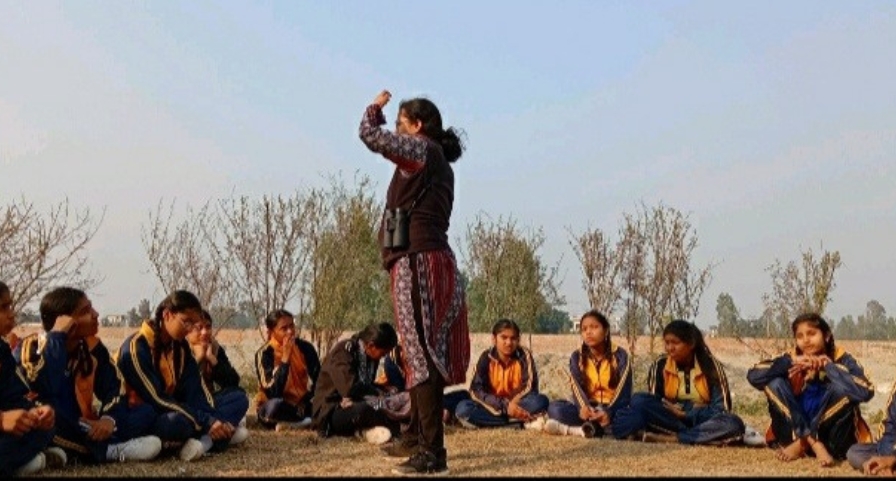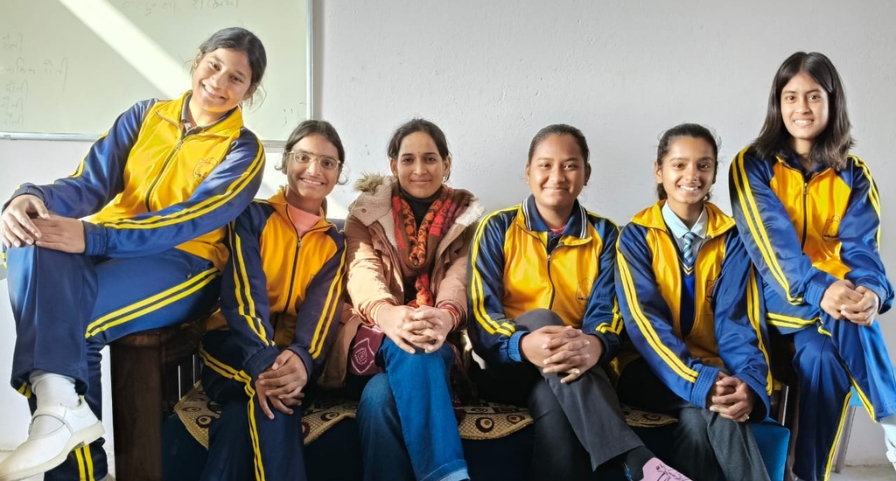In today’s world, hectic schedules and rampant consumerism have led to an environment overflowing with waste. Among the most pressing concerns is the growing problem of menstrual waste, primarily from single-use sanitary napkins made of plastic and harmful chemicals.
Sanitary napkins contain endocrine-disrupting chemicals such as phthalates, phenols, and parabens, which pose serious risks to women’s reproductive health. Their prolonged use can cause skin rashes, menstrual irregularities, and other health complications.

Additionally, their disposal presents a significant challenge. These pads cannot be burned without releasing toxic fumes that may cause severe health hazards, including cancer. Recycling is impossible, and no plastic collection centres accept used sanitary products. This issue is not limited to a specific region. It affects communities worldwide.
However, five determined young girls from Nanakmatta, a developing town in the eastern Terai region of Uttarakhand, took it upon themselves to address this pressing problem. Aditi, Harshita, Sheetal, Neha, and Anjali, students of Nanakmatta Public School (NPS), realised the severity of menstrual waste disposal at their school.
Also watch: Managing menstrual waste in the Andamans
The beginning of a movement
The girls’ journey towards sustainable menstruation began on August 12, 2023, when a team from Nature Science Initiative (NSI) – an organisation dedicated to nature and sustainability education–visited their school.

The team conducted nature walks and plastic literacy workshops for the students. When the topic of menstrual waste disposal arose, NSI organised a special session for girls under the banyan tree, a space known as the “extended classroom” of NPS.
In this session, Riddhima Karwa, a nature and sustainability educator from NSI, spoke about the harmful effects of sanitary napkins on human health and the environment. The first session was largely one-sided–no one spoke about their personal experiences.
A few months later, Riddhima and Dr. Soumya Prasad conducted a second session on sustainable menstruation with the same group of girls. This time, the atmosphere had changed. The girls felt more comfortable sharing their experiences.
Reflecting on the change, Aditi Rana says, “During the first session, we were hesitant to speak up. We feared being judged or laughed at. But deep inside, we had so many questions – especially about how to dispose off sanitary pads. We were forced to keep it a secret, and most of our used pads ended up in the fire or water bodies.”
Sheetal adds, “We knew that burning or dumping sanitary pads in water bodies was wrong, but we had no other option. Everything had to be done in secrecy. We couldn’t even discuss this with our mothers or brothers at home.”

The issue was not just about disposal. It was about shifting to sustainable and healthy menstrual products. Dr. Kamlesh Atwal, a supporter of the initiative, points out, “Menstrual waste was a major challenge in our school. We didn’t know what to do with it. We used to bury the waste, but stray dogs would dig it up and spread it across the campus.”
Also read: ‘Padman of Kolhan’ goes the extra mile for menstrual health
A shift to sustainable alternatives
Following these discussions, Aditi Rana took the initiative to switch to a menstrual cup. It took her six months to fully transition, but her experience encouraged other girls to follow suit. Gradually, the number of menstrual cup users grew to five, and together, they formed the Sustainable Menstruation Project.
Their mission was to educate girls about the health and environmental impacts of sanitary napkins and to create an open dialogue about menstruation.
However, in a society where periods were considered a private matter, the challenge was how to initiate conversations and convince others to make the switch. To tackle this, the five girls travelled to Dehradun for a five-day internship at the NSI campus.
There, they received training and developed strategies to introduce their project effectively. Equipped with knowledge and tools, they returned to their school and began implementing their plan, starting with their classmates.

Once their classmates were on board, they expanded their outreach to senior and junior students, teachers, and even parents through parent-teacher meetings.
Overcoming challenges and expanding their impact
One of the biggest hurdles was making menstrual cups accessible. While they are cost-effective in the long run, their initial price seemed expensive, and availability in local markets was limited. Once again, the Nature Science Initiative stepped in, providing menstrual cups at highly subsidised prices.
Praising the girls’ efforts, Dr. Soumya Prasad states, “What these students have achieved is remarkable. No other school in Uttarakhand has ever taken such an initiative. We had the vision, but these girls turned it into reality, overcoming significant social challenges. A friend of mine, Chitra, provided a grant that allowed us to procure menstrual cups in bulk. This enabled us to offer them at a lower cost or even free to those who couldn’t afford them.”
These young changemakers didn’t stop at their school. With support from their teachers and the NSI team, they travelled across the state, engaging with hundreds of women of all ages.
Recognition and impact
So far, more than 80 girls have successfully switched to sustainable menstrual products thanks to their efforts. Their work has not gone unnoticed. On February 22, 2025, the team was honoured with the prestigious Wipro Earthian Award, a flagship programme of the Wipro Foundation, at Azim Premji University.

Their story is an inspiring example of how a small group of determined individuals can create a significant impact. By challenging social taboos, educating their peers, and promoting sustainable alternatives, these five girls from a small town in Uttarakhand have set a powerful precedent for menstrual health advocacy and environmental responsibility.
Their journey is a reminder that real change starts with awareness, education, and the courage to challenge societal norms–one conversation at a time.
Also read: Fostering menstrual health and women’s empowerment in rural India
The lead photo at the top shows the Sustainable Menstruation Project team members which includes students Neha, Sheetal, their teacher and mentor Varsha Kandpal, and other students Aditi Rana, Anjali Bhatt and Harshita Joshi. (Photo by Kamlesh Atwal)
Mukesh Kandpal is a Nature & Sustainability Educator at Nature Science Initiative.








